“The pitcher goes to the well until it breaks.”
“The pitcher will go to the well once too often.”
A warning against pushing one’s luck too far.
De kruik gaat zolang te water tot ze barst
(Cf. early 14th-century Fr. tant va pot à eve qu’il brise, from the Oxford Dictionary of Proverbs)

Animal Camel Desert Resting Tranquil Solitude Concept
Page Description
A reminder that it is important to pay attention to the cumulative effects of small events or factors, as they can have a significant impact in the long run
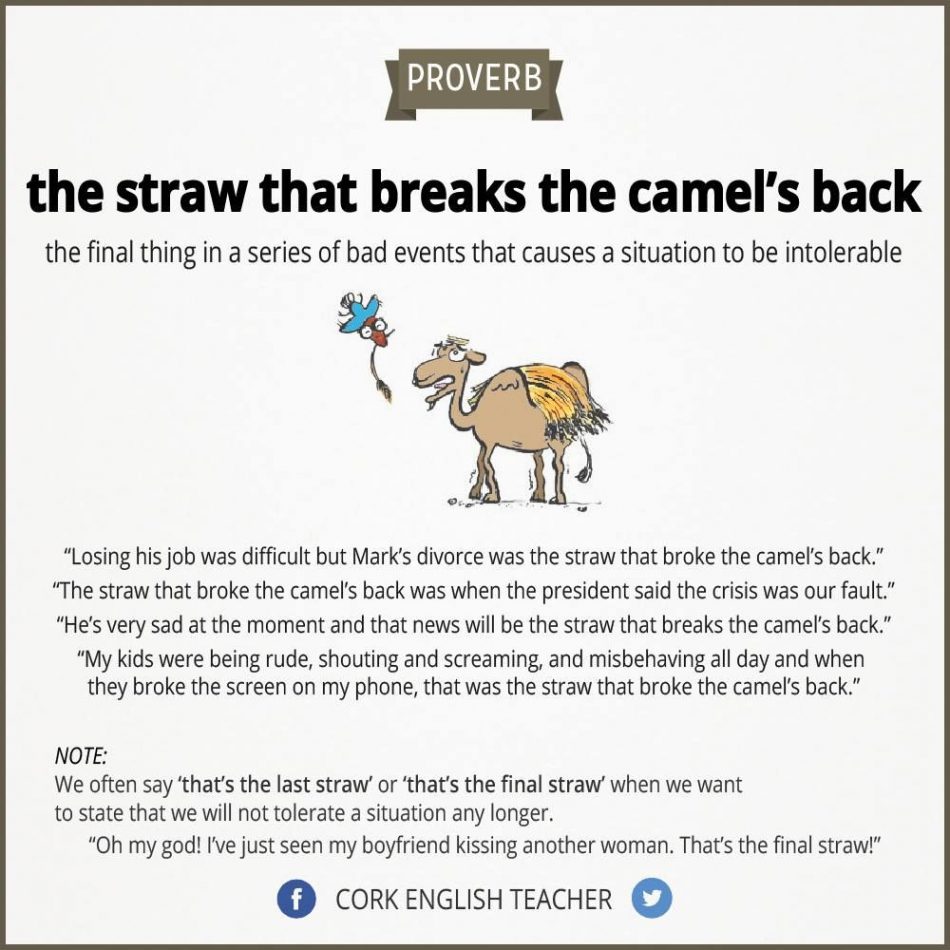
the last in a series of unpleasant events that finally makes you feel that you cannot continue to accept a bad situation:
Losing my job was bad enough, but being evicted was the final straw.
She’s always been rude to me, but it was the last straw when she started insulting my mother.
Cambridge Dictionary
The English equivalent expression for the Dutch saying
“de druppel die de emmer doet overlopen” is
“the straw that broke the camel’s back.“
Both phrases convey the idea that a seemingly small or insignificant event, the final drop or straw, leads to a larger, often negative, consequence or reaction.
When Injustice Becomes Too Heavy to Bear
The Straw that Breaks the Camel’s Back
Sometimes, a single event exposes the breaking point of a system already burdened by injustice. This page delves into the meaning of the saying “the straw that breaks the camel’s back,” illustrating how cumulative failures can lead to catastrophic outcomes.
Through text, imagery, and two powerful videos, we explore how the Post Office scandal became a defining example of such a breaking point.
- In Post Office Scandal – The Tour, Nick Wallis and Tony Downey share firsthand insights into the human cost of the Horizon IT disaster and the pursuit of justice.
- In “Can’t Believe This Is True”, actor Will Mellor recounts the emotional toll of portraying a victim of the scandal, shedding light on the devastating impact of institutional failures.
Together, these stories reveal how the weight of persistent wrongdoing can ultimately collapse even the most trusted institutions.
Wanneer onrecht ondragelijk is
Soms onthult één enkele gebeurtenis het breekpunt van een systeem dat al bezwijkt onder de last van onrecht.
Deze pagina gaat dieper in op de betekenis van de uitdrukking “de druppel die de emmer doet overlopen” en laat zien hoe opeenstapelende fouten kunnen leiden tot rampzalige gevolgen.
Aan de hand van tekst, beelden en twee krachtige video’s onderzoeken we hoe het Post Office-schandaal een schoolvoorbeeld werd van zo’n breekpunt.
- In Post Office Scandal – The Tour delen Nick Wallis en Tony Downey uit de eerste hand inzichten over de menselijke tol van de Horizon-IT-ramp en de strijd voor gerechtigheid.
- In Can’t Believe This Is True vertelt acteur Will Mellor over de emotionele impact van het vertolken van een slachtoffer van het schandaal en werpt hij licht op de verwoestende gevolgen van institutioneel falen.
Samen onthullen deze verhalen hoe de last van aanhoudend onrecht uiteindelijk zelfs de meest vertrouwde instellingen kan laten instorten.
“The straw that breaks the camel’s back” is a popular idiom that is used to describe a situation where a small or seemingly insignificant event or factor causes a larger, more significant outcome or consequence. The key points of this idiom can be summarized as follows:
Cumulative effect: The idiom implies that there is a cumulative effect of small, often unnoticed events or factors that gradually build up over time, and eventually lead to a tipping point or a breaking point.
Overload: The camel’s back represents a threshold or limit beyond which a burden or load becomes too heavy to bear. The idiom suggests that the cumulative effect of smaller burdens becomes overwhelming and causes the final, decisive event or factor to trigger a negative outcome.
Unpredictability: The triggering event or factor is often unexpected or seemingly minor, and may not be directly proportional to the overall burden or load. It could be a seemingly insignificant event that, in combination with the existing burdens, causes a sudden and unexpected collapse or failure.
Context-dependent: The idiom is used in various contexts, including personal, social, political, and economic situations. It can refer to a wide range of scenarios, such as stress, pressure, responsibilities, problems, or challenges, where a seemingly small event or factor leads to a significant outcome.
Warning: The idiom serves as a cautionary reminder that it is important to pay attention to and manage the cumulative effects of small events or factors, as they can have a significant impact in the long run. It underscores the idea that seemingly minor issues should not be ignored, as they may eventually contribute to a larger problem.
In summary, “the straw that breaks the camel’s back” conveys the idea of a small event or factor causing a significant outcome due to the cumulative effect of smaller burdens or loads. It emphasizes the importance of being mindful of seemingly minor issues and managing them to prevent negative consequences.
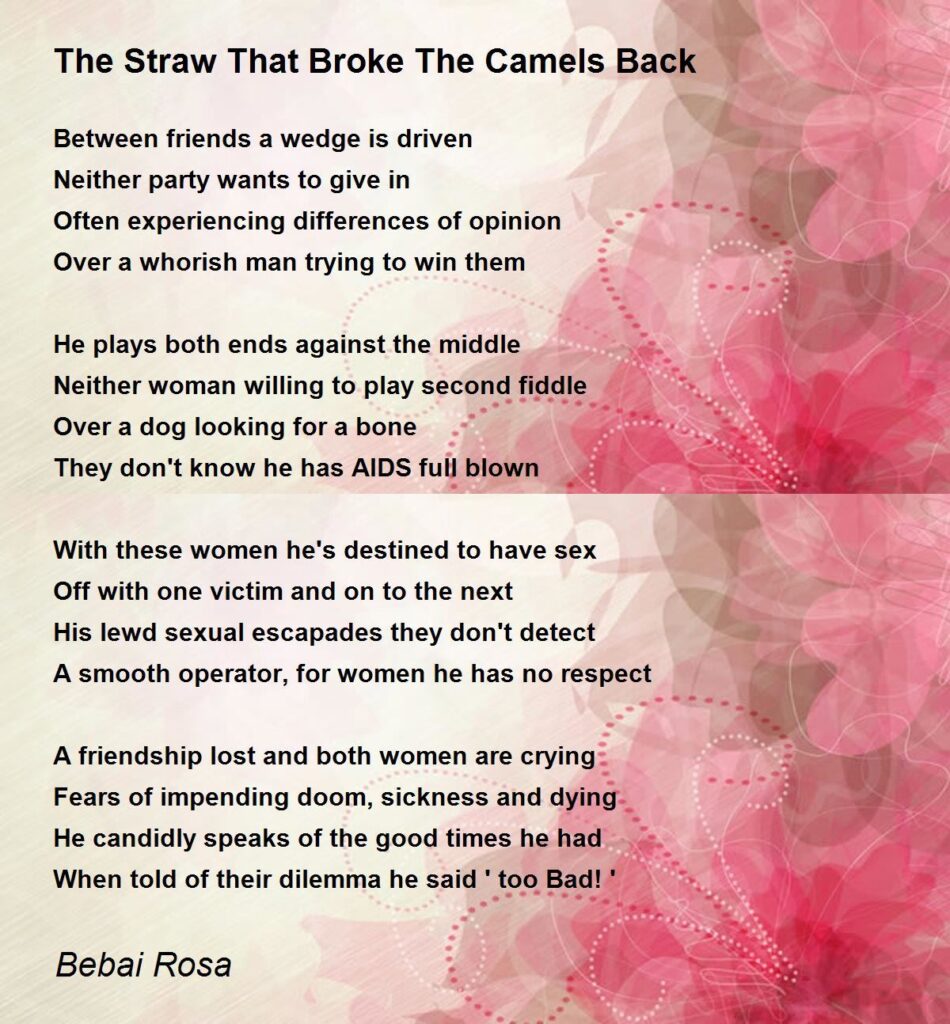
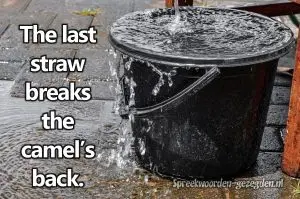
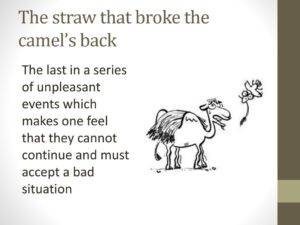
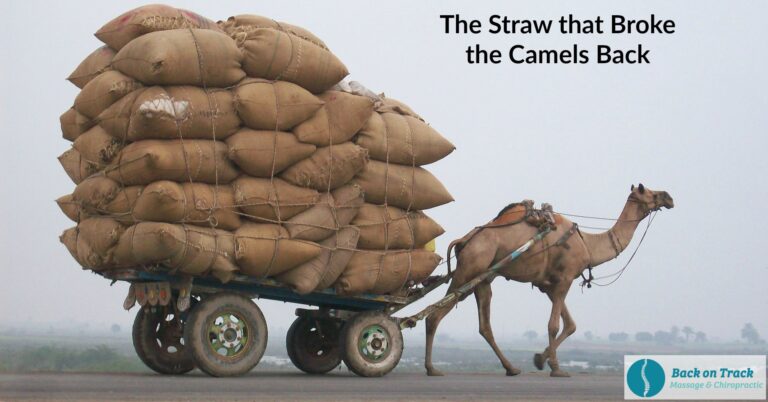
Origins and early uses
The earliest known version of the expression comes in a theological debate on causality by Thomas Hobbes and John Bramhall in 1654–1684:
The last Dictate of the Judgement, concerning the Good or Bad, that may follow on any Action, is not properly the whole Cause, but the last Part of it, and yet may be said to produce the Effect necessarily, in such Manner as the last Feather may be said to break a Horses Back, when there were so many laid on before as there want but that one to do it.
Oorsprong en vroeg gebruik
De vroegst bekende versie van de uitdrukking komt voor in een theologisch debat over causaliteit tussen Thomas Hobbes en John Bramhall in de periode 1654-1684:
Het laatste oordeel over het Goede of Slechte dat kan volgen op enige Actie, is niet strikt genomen de hele Oorzaak, maar het laatste Deel ervan, en kan toch gezegd worden het Effect noodzakelijkerwijs voort te brengen, op zo’n manier als het laatste Veertje gezegd kan worden de Rug van een Paard te breken, wanneer er zoveel op gelegd zijn dat er maar dat ene nodig is om het te doen.
Post Office Scandal: what did top executive know?
17 apr 2024
She’s been described as the Post Office executive who knew more about the Horizon IT scandal than anybody else.
Angela van den Bogerd personally oversaw complaints about Horizon problems since 2010 and was part of a mediation scheme that was supposed to get to the bottom of why so many subpostmasters were being accused of theft.
But she defended the Post Office until the bitter end, even as late as 2019, during the High Court class action which Alan Bates and his group of fellow postmasters won.
More secret tapes prove Post Office boss briefed on system backdoor
2 apr 2024
More shocking revelations from secret recordings obtained by Channel 4 News show that Post Office boss Paula Vennells was briefed about allegations of a “covert operations teams” – and that it could remotely alter sub-postmasters accounts from Fujitsu’s HQ without them knowing.That was in 2013. Seven years later, in letters to a parliamentary committee, Paula Vennells insisted she had been told by Fujitsu this was not possible.
Meanwhile the Post Office had taken innocent sub-postmasters to court, saying they must have stolen money when their accounts failed to add up – a miscarriage of justice that the tapes also reference.
1 ‘Post Office Scandal- The Tour’. BBC Breakfast – Nick Wallis and Tony Downey. Tour details below
2 “Can’t Believe This Is True” | Will Mellor Shares His Experience Of Playing Horizon Scandal Victim
8 jan 2024
The wrongful convictions of hundreds of subpostmasters due to faulty digital accounting software have been described as the most widespread miscarriage of justice in UK history.
The scandal has recently come back into the spotlight following ITV’s four-part drama Mr Bates vs The Post Office.
Actor Will Mellor tells Ian Collins what his reaction was when he first read the script.
“I started reading it and just kept putting it down and going, I can’t believe this is true.”
The limits of our policy: The point of no return
Openingscollege premier De Wever aan UGent
8 okt 2025
Bij ongewijzigd beleid zal onze welvaartsstaat zonder enige twijfel instorten, en dus heeft hij als premier van de federale regering geen andere keuze dan het beleid te voeren dat in het regeerakkoord is afgesproken. Dat is de belangrijkste boodschap van premier Bart De Wever (N-VA) tijdens het openingscollege politicologie aan de Universiteit Gent. Hij verpakte zijn boodschap in een uitvoerig onderbouwde lezing van zo’n anderhalf uur.
00:00:00 intro Ivan De Vadder
00:01:46 rector Petra De Sutter
00:04:40 Carl Devos
00:08:40 college Bart De Wever
02:03:33 slot Carl Devos
02:03:56 outro Ivan De Vadder
In this compelling lecture, Belgium’s Prime Minister, Bart De Wever, delivers an insightful and thought-provoking address to the students of Ghent University. Known for his deep intellectual approach to politics and governance, De Wever reflects on the challenges facing Belgium and Europe today. As a prominent political figure, his perspectives are shaped by years of experience in both local and national politics, offering a unique vantage point on the complexities of modern leadership.
Openingscollege Premier Bart De Wever aan UGent
De grenzen van ons beleid: Het punt van geen terugkeer
In dit boeiende openingscollege geeft de Belgische premier, Bart De Wever, een diepgaande en inspirerende lezing voor de studenten van de Universiteit Gent. Bekend om zijn intellectuele benadering van politiek en bestuur, reflecteert De Wever op de uitdagingen waarmee België en Europa vandaag de dag geconfronteerd worden. Als prominent politiek figuur zijn zijn standpunten gevormd door jarenlange ervaring in zowel de lokale als nationale politiek, waardoor hij een uniek perspectief biedt op de complexiteit van modern leiderschap.
Unexpected Twist: The Charity Trap
3 Instant Accomplice: Wife vs. Husband Charity Gifts Prank
22 sep. 2012